Basic Approach
The Maruha Nichiro Group's philosophy is to contribute to people's enriched lives by providing authentic, safe, and healthy food. We believe that realizing this philosophy requires continuously and stably providing consumers with sustainable food that contributes to enhancing their health value while addressing social and environmental challenges. The Maruha Nichiro Group will continue to contribute to our customers' enriched lives by providing food that contributes to creating health value and sustainability.
The Management System
Maruha Nichiro established the Health Value Creation and Sustainability Food Provision Project (hereinafter “Health Project”) in fiscal 2022 to define and establish criteria for “food that contributes to creating health value” and “food that contributes to sustainability,” promote their adoption throughout the group, and advance their implementation. The Health Project is led by the Executive Officer in charge of Marketing as Project Owner and the General Manager of the Marketing Department as Project Leader. Members include planning personnel from seven units (Fisheries, North America, Seafood Trading, Processed Foods, Fine Chemicals, Ingredient Distribution), the Consumer-Oriented Promotion Department, the Central Research Institute, and the Development Department. The Sustainability Strategy Department and the Marketing Department serve as the secretariat.
Starting in fiscal 2024, Health Project welcomed external experts Kenji Fuma and Shoichiro Tsugane to evaluate its activities and provide regular feedback.
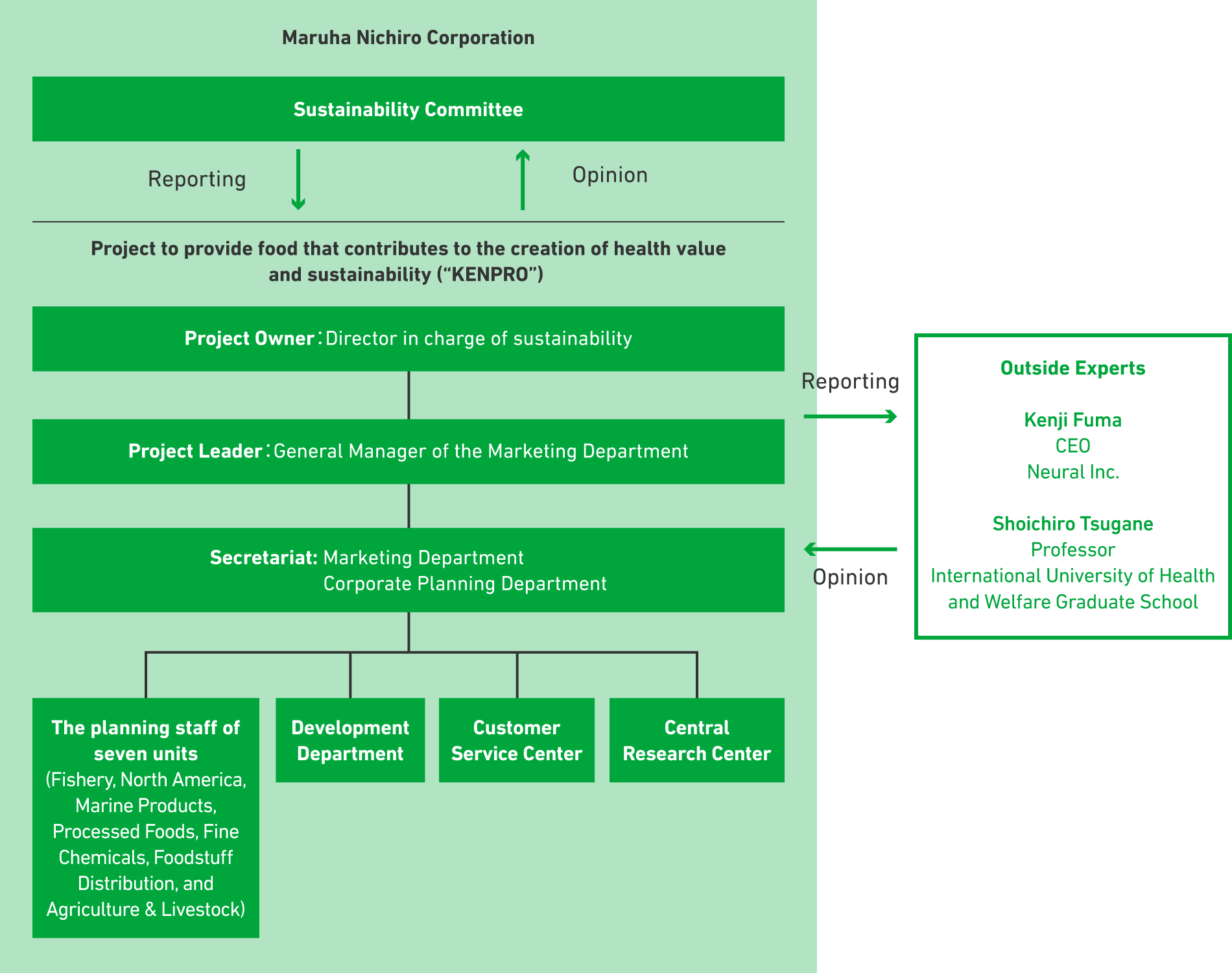
Sustainability Committee Results for FY2022
Number of events held:4
Results of the Previous Medium-Term Management Plan (FY2022–2024)
Materiality: Providing food that contributes to health value creation and sustainability
KGI (Desired State by 2030): Established as a leading food company contributing to health value creation and sustainability
Responsible Department: Project to Promote Food Contributing to Health Value Creation and Sustainability
| KPI | Target | Self-Assessment and Challenges of the Mid-Term Management Plan | ||
|---|---|---|---|---|
| Target Year | Target value | Progress Results Comment | Self-assessment | |
| Establishing Product Standards Contributing to Health Value Creation and Sustainability and Setting FY2030 Targets (Maruha Nichiro Corporation) | 2024 | ー | Establishment of product standards and setting of fiscal year 2023 targets completed as scheduled | ★★★☆☆ |
| Establishing an External Evaluation Method for Companies Contributing to Health Value Creation and Sustainability (Maruha Nichiro Corporation) | 2024 | ー | It has been decided to utilize ESG ratings for external evaluations. | ★★★☆☆ |
★★★★★ : KPI for FY2030 achieved.
★★★★☆ : Progress toward achieving KPI for FY2030 in advance.
★★★☆☆ : KPI for FY2024 achieved or progress toward achieving KPI for FY2030 as planned.
★★☆☆☆ : KPI delayed.

Medium-Term Management Plan (FY2025–2027) KGI, KPI
Materiality: Providing food that contributes to health value creation and sustainability
KGI (Desired State by 2030): Established as a leading food company contributing to health value creation and sustainability
Responsible Department: Project to Promote Food Contributing to Health Value Creation and Sustainability
| KPI | Target | |
|---|---|---|
| 2027 Fiscal Year Target 2027 Fiscal Year Goals | 2030 Fiscal Year Target | |
| Percentage of Product Sales Meeting Each Product Standard (Maruha Nichiro Corporation) | ー | Products meeting appropriate salt intake standards: 65% or more Products meeting appropriate protein intake standards: 45% or more Products meeting high-quality fat intake standards: 20% or more GSSI-certified sustainable seafood products: 15% or more |
| ESG Evaluation Including Health Value Creation and Sustainability (Maruha Nichiro Corporation) | ー | Improving ESG ratings |
Maruha Nichiro Initiatives
The Vision for Projects Contributing to Health Value Creation and Sustainability
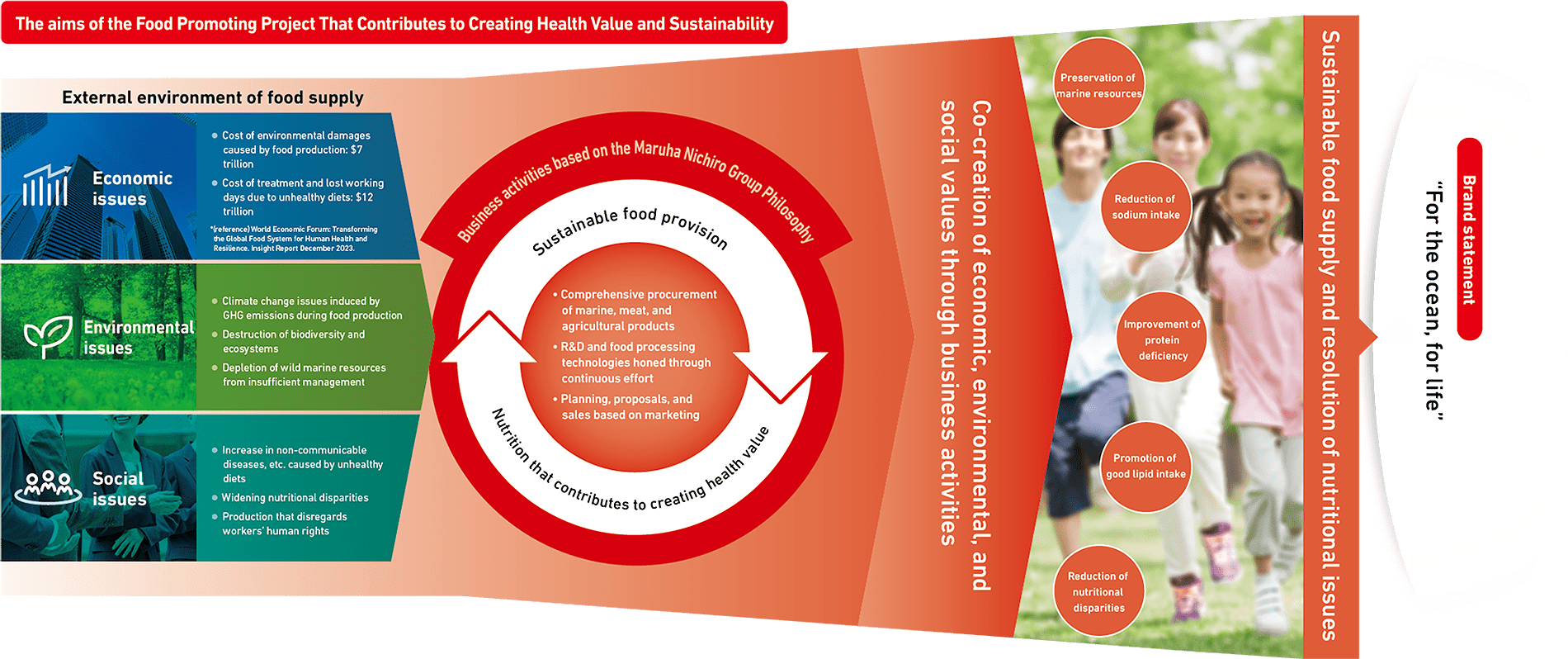
Nutrition That Contributes to Creating Health Value
Maruha Nichiro Corporation promotes the provision of nutrition that contributes to creating health value through the following initiatives.
- We provide opportunities for nutritionally rich meals by offering products in appropriate forms that meet consumer needs and at accessible prices through diverse channels.
- We ensure consumers can easily access nutritional information contained in our products by providing not only clear, legally required nutritional labeling but also additional disclosures.
- All information disseminated will be based on scientific evidence, ensuring marketing communications accurately reflect product characteristics.
- Our internal standards will be aligned with external benchmarks (public standards where possible).
- We will establish internal standards related to nutrition for the following four nutritional challenges closely linked to Japan's health issues. By setting sales ratio targets for products meeting these standards and expanding their sales, we will contribute to solving these challenges.
Nutrition Issues Maruha Nichiro Prioritizes
- Appropriate salt intake (We will consider serving methods, including portion sizes and labeling, to prevent excessive salt consumption)
- Appropriate protein intake
- intake of high-quality fats
- Providing meals (nursing care meals) that contribute to improving nutritional disparities
Approach, Criteria, and Progress Status for KPI Setting
Based on our endorsement of two action plans—“Promoting Innovation in the Food Industry” and “Promoting Behavioral Change Regarding Individual Nutrition”—in the agenda for the “Tokyo Nutrition Summit 2021” hosted by the Japanese government, we established four evaluation criteria: “Adequate Protein Intake,” “Adequate Salt Intake,” “Intake of High-Quality Fats,” and “Nutrition Intake for Those with Difficulty Eating Regularly (Improving Nutritional Inequality).”
Recognizing that many of our products already deliver health benefits and acknowledging our current contribution, we set the KPI as the sales ratio of target products. This aims to increase the proportion of target products within total sales. By using sales ratio as the KPI, we also consider the interconnection between creating economic value and social value through our business activities.
| Criteria | FY2030 Key Performance Indicators | |
|---|---|---|
| Proper sodium intake | Less than 3g per serving, or less than 0.46g per 100kcal*1 | Sales ratio of products meeting the standards among processed foods subject to the criteria: 65% or more |
| Proper protein intake | 4.1g or more per 100kcal, or 8.1g or more per 100g*2 | Sales ratio of products meeting the standards among processed foods: 45% or more |
| Good fat intake | At least 350mg per serving, or at least 1mg per gram*3 | Sales ratio of products meeting the standards among processed foods subject to the criteria: 20% or more |
| Reducing nutritional disparities | Promoting foods that support nutritional intake for individuals with chewing and swallowing difficulties | Sales amount of target products at 190% or more compared to fiscal year 2022 |
- *1
- Our company standard based on the “properly” criterion of the Smart Meal standard
- *2
- Our company standard based on the “contains” criterion of the Consumer Affairs Agency labeling standard
- *3
- Our company standard setting intake targets for fish-derived n-3 polyunsaturated fatty acids based on the Ministry of Health, Labour and Welfare's 2020 Dietary Reference Intakes for n-3 polyunsaturated fatty acids
Actual Values for Fiscal Year 2024 and Targets for Fiscal Year 2030
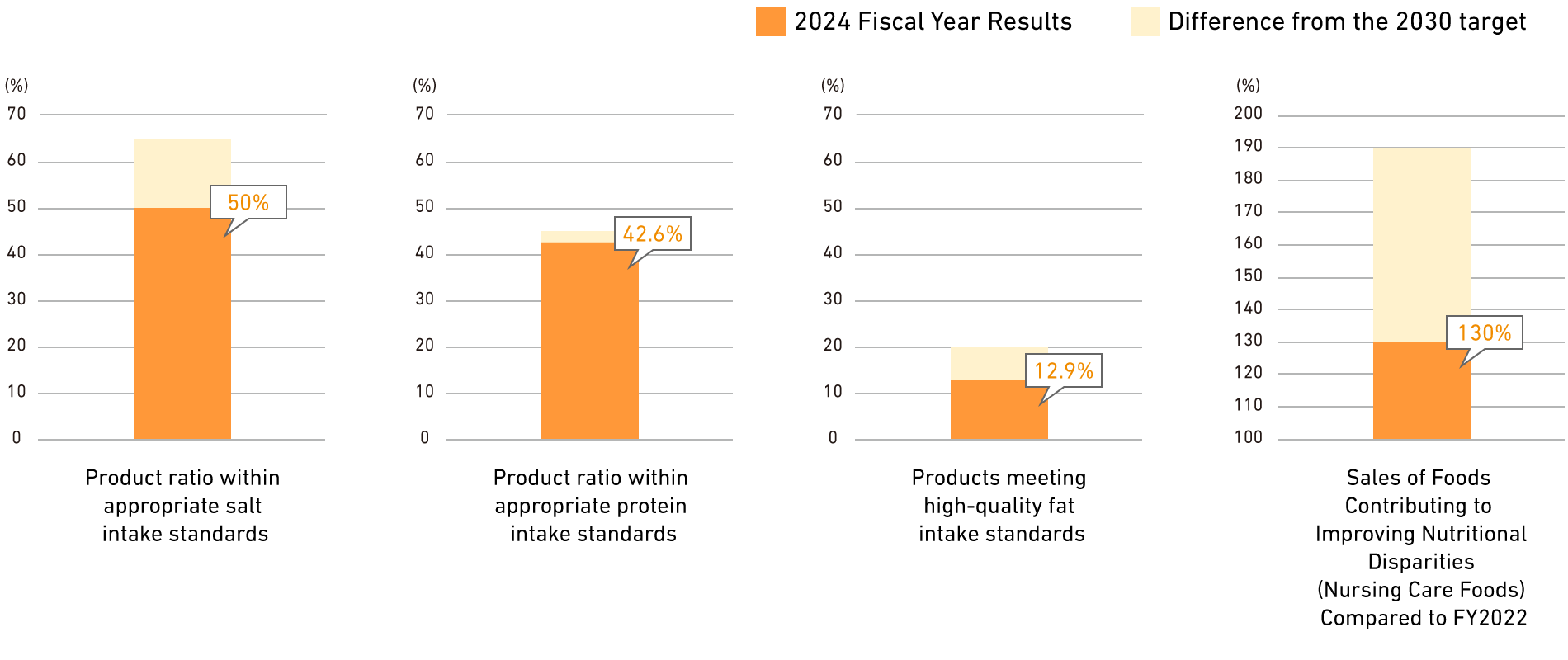
Specific Initiatives
We created a dashboard enabling employees to constantly monitor progress. Additionally, to disseminate health and nutrition information externally, we renewed our owned media platform “Oishiine!!” (Delicious!!) in April 2025. Under the concept “Health is delicious,” “Oishiine!!” will communicate our initiatives through two-way communication with customers. In July 2024, we submitted action goals and evaluation metrics centered on “appropriate salt intake” to the Ministry of Health, Labour and Welfare's “Healthy and Sustainable Food Environment Strategy Initiative” (for details, see Participation in the Ministry of Health, Labour and Welfare's “Healthy and Sustainable Food Environment Strategy Initiative”). Moving forward, we will expand the handling of health value creation products based on our overall marketing strategy.
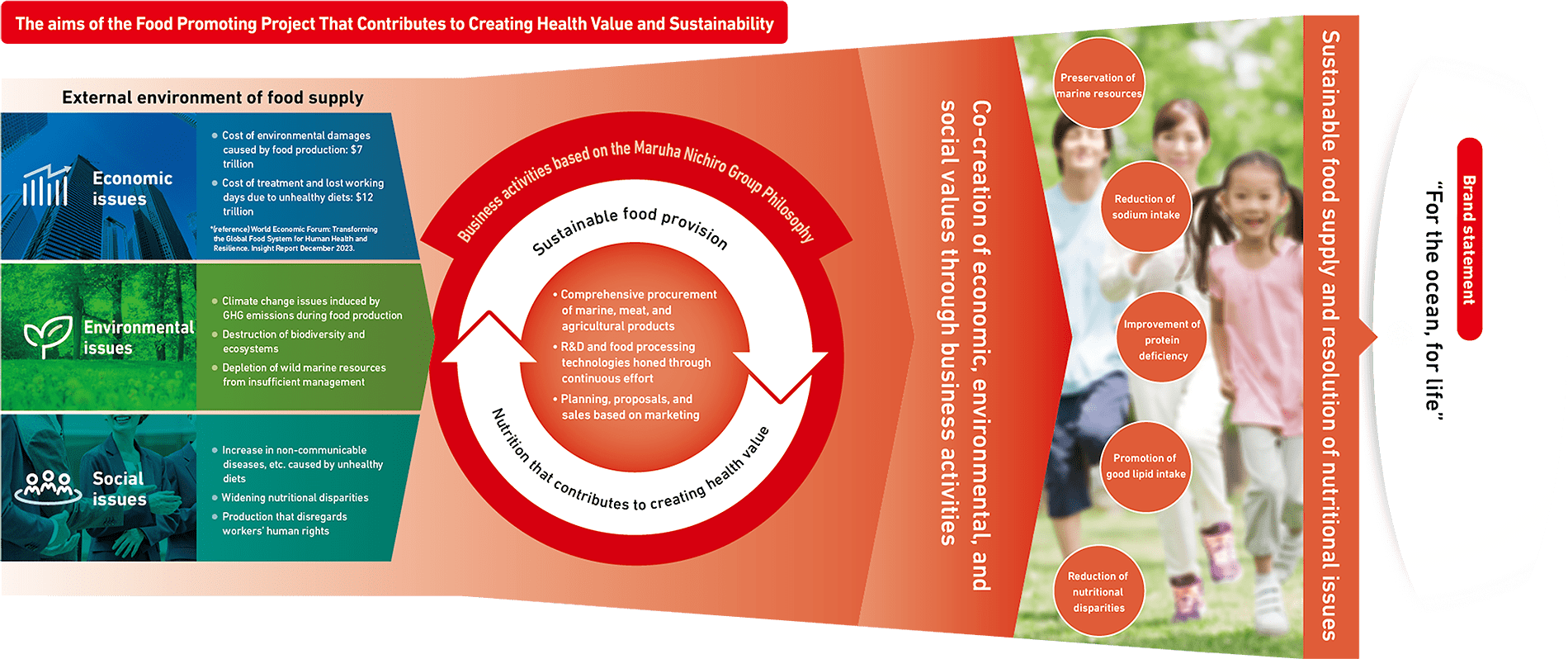
Industry-Academia-Government Collaboration Initiatives
Participation in the Ministry of Health, Labour and Welfare's “Healthy and Sustainable Food Environment Strategy Initiative”
In January 2023, we joined the Ministry of Health, Labour and Welfare's “Healthy and Sustainable Food Environment Strategy Initiative.” This initiative aims to create food environments where everyone can naturally achieve good health through collaboration and cooperation among industry, academia, and government. Participating companies are required to set action goals and evaluation indicators using the SMART format*, enabling them to discuss and collaborate on more effective measures with other participating companies. Setting action goals and evaluation metrics to address “excessive salt intake”—one of the nutritional challenges highlighted by the initiative—aligns with our company's policy of “food that contributes to creating health value.” Through our participation, we will also promote behavioral changes, particularly regarding salt intake, within the dietary habits of the Japanese population.
* SMART format: A goal-setting framework comprising five elements: Specific, Measurable, Achievable, Relevant, and Time-bound.
Strategic Initiative for a Healthy and Sustainable Food Environment (HSFE)
Message from Expert

Soichiro Tsugane
Professor
International University of Health and Welfare Graduate School
M.D., Ph.D. Former Executive Director of National Institutes of Biomedical Innovation, Health and Nutrition and Director of National Institute of Health and Nutrition. Former Director of the Center for Public Health Sciences, National Cancer Center.
Providing sustainable and healthy food is an essential challenge for humanity's future and a social responsibility that food companies must actively address. In Europe and the United States, obesity and ischemic heart disease are serious health issues, with key countermeasures focusing on limiting energy and saturated fat intake. In Japan, however, underweight and stroke are the primary health concerns, influenced by low energy and protein intake, as well as excessive salt consumption inherent in the Japanese diet. Furthermore, Japan's internationally low ischemic heart disease mortality rate is partly attributed to the historical consumption of unsaturated fatty acids from seafood. The recent decline in fish consumption is a cause for concern. Against this backdrop, Maruha Nichiro's four initiatives—salt reduction, adequate protein, quality fats, and addressing nutritional disparities—are directly aligned with Japan's health challenges. We believe these efforts contribute to society by helping extend healthy life expectancy.
Sustainability-Conscious Food
Key Activities
As the world population grows, the environmental impact of food supply systems continues to increase. Maruha Nichiro Corporation contributes to solving environmental challenges by increasing the sales ratio of certified seafood produced through sustainable fishing and aquaculture.
Approach, Criteria, and Progress Status for KPI Setting
Seafood products circulating globally are considered to carry numerous risks, including depletion of wild fisheries resources, environmental damage from aquaculture, and involvement in IUU fishing. In addition to addressing these risks, we have decided to actively promote the handling of seafood produced by sustainable fisheries and aquaculture operations holding internationally recognized certifications approved by the Global Sustainable Seafood Initiative (GSSI). This initiative is part of our value proposition for “sustainability-conscious food,” with specific KPIs established. Similar to health value creation, we will advance this initiative by setting the sales ratio of certified products as a KPI relative to total sales.
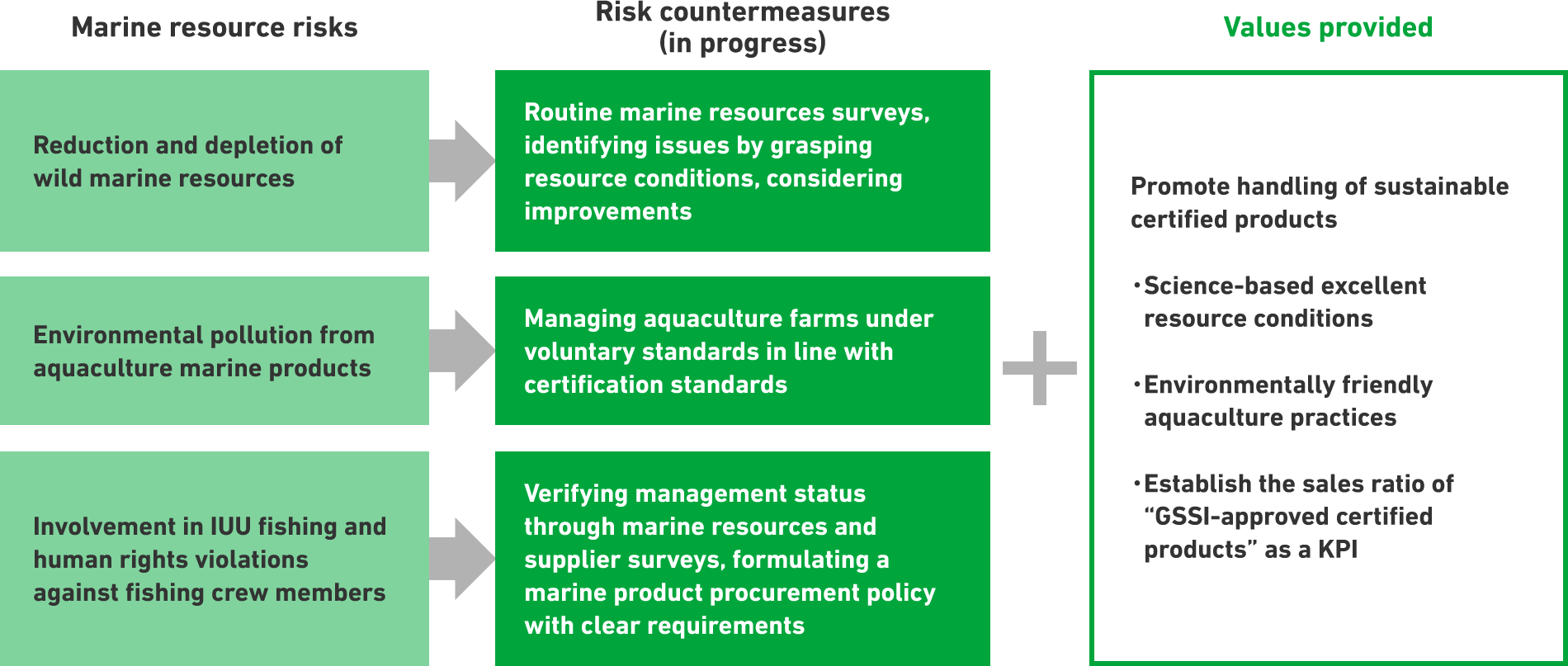
Evaluation Item for Sustainability
| Standard | FY2030 KPI | |
|---|---|---|
| Sustainable certified product | GSSI certified marine products*4 | Sales ratio of sustainable certified products among all products including fishery and marine products 15% or more |
- *4
- Certified marine products approved by the Global Sustainable Seafood Initiative (MSC certification, ASC certification, BAP certification, MEL certification, etc.)
Actual Values for Fiscal Year 2024 and Targets for Fiscal Year 2030
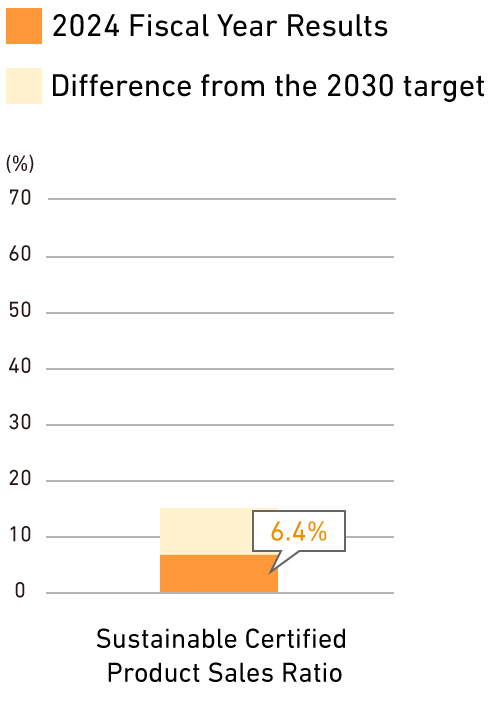
Specific Actions
We believe it is essential to clearly communicate the significance of handling sustainable seafood to our customers through our business activities, while also widely disseminating and raising awareness within society at large. To this end, we actively engage in initiatives such as publishing articles in newspapers and magazines and delivering lectures at seminars. At the “Japan International Seafood Show 2024” held in August 2024, in addition to exhibiting our certified sustainable products “Sustainable Seafood,” we conducted a seminar in a dialogue format featuring our employees and MSC Japan. Furthermore, at the “Japan International Seafood Show 2025” held the following August, alongside the Sustainable Seafood exhibition, we held a dialogue-style seminar featuring our company employees and the Global Seafood Alliance (GSA), which operates the BAP certification, discussing the challenges currently facing the seafood industry. Starting in August 2025, we began distributing a dedicated sustainable seafood catalog, enabling us to share information about sustainable seafood with a wider customer base. We will continue striving to expand the sustainable seafood market through various information initiatives.
Sustainable Seafood Catalog
https://www.maruha-nichiro.co.jp/products/ebook/100/
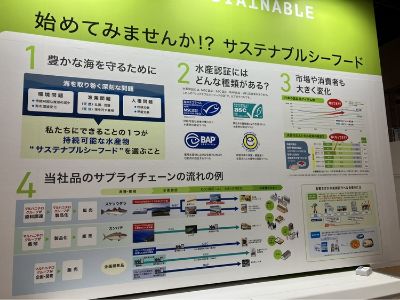
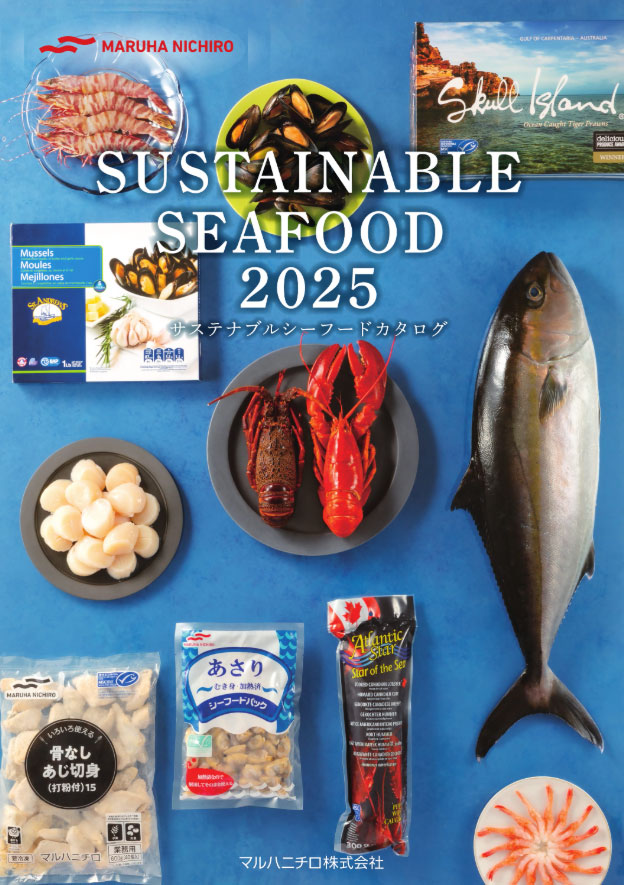
Message from Expert

Kenji Fuma
Kenji Fuma
CEO
Neural Inc.
A non-executive director of board or advisory board member for several companies in the ESG field. Has served on committees of the Ministry of the Environment, Ministry of Agriculture, Forestry and Fisheries, Ministry of Health, Labour and Welfare, Ministry of Economy, Trade and Industry, and others. Authored many books and given numerous lectures.
Maruha Nichiro's stated commitment to “providing food that contributes to health value creation and sustainability” is an extremely material theme for the fisheries sector. The FY2030 targets set in 2024 were incorporated into the personnel evaluation system in FY2025, and a dashboard was developed to provide employees with constant visibility into progress. These disclosures indicate the steady evolution of management. Globally, demand for healthy fish consumption is rising, while issues like environmental changes and poor catches due to overfishing are becoming more severe. As a major distributor, we expect you to advocate for sustainable fish consumption practices to both domestic and international fisheries stakeholders and consumers. We believe this will enhance the sustainability of your business and elevate your corporate value.

